April 24, 2020
Facemasks Become Fashion Statement
With more areas mandating the use of cloth facemasks in public, consumers naturally want to express themselves with custom-decorated versions.
Once state and local governments began recommending (and in some areas mandating) that cloth masks be worn in public, it was inevitable that demand for more fashionable, decorated versions would skyrocket. Clothing is a form of self-expression for many, and a facemask is one of the most conspicuous garments a person can wear.
And as the country moves to gradually reopen commerce, public gatherings and travel as COVID-19 cases dwindle in the coming weeks, it’s likely the demand for facemasks will remain strong. “I think you’re going to see people wearing masks on planes,” says Brayden Jessen, owner of Zome Design (asi/366115) in Spokane Valley, WA. “I think [wearing masks] is going to be the new norm.”
The ability to customize and personalize a mask, however, helps to cut the discomfort that many feel when wearing a face covering in public.
“I can’t see the general population wanting to wear surgical masks for very long,” says Rich Santo, CEO of Culture Studio (asi/700559) in Chicago. “I think that the cooler masks get, the more people will enjoy wearing them.” (Plus, he adds, surgical masks and N95 respirator masks should be reserved for healthcare and frontline workers.)
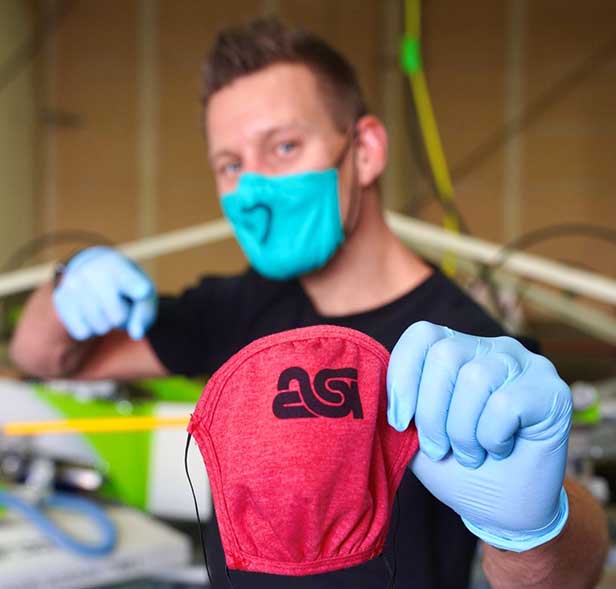
Allmade Apparel developed the Allmask, an eco-friendly mask, that can be decorated or sold blank.
Ryan Moor, CEO of apparel supplier Allmade Apparel (asi/34341) and screen-printing supply company Ryonet, expects the evolution of decorated facemasks to follow along the same lines as the ubiquitous fashion staple, the T-shirt, albeit on an accelerated timeline. “We started out with basic white tees in 1913,” he says. “Now look at the options. Masks are going to be similar to that. I do see them being a staple long-term for the promotional products industry, like a hat perhaps, with just as many options.”
Many decorators have already begun experimenting with custom facemasks, sewing their own with leftover fabric or chopping up unsold T-shirts in their warehouses. “It’s been like a roller coaster,” Santo says. “One moment we were going to completely shut down, then all of a sudden we went back to, ‘Can we actually make something that can help?’ We have 800,000 garments sitting in our building. What can we do with them?”
Culture Studio is making two different types of mask: one is a T-shirt cut and sewn into a real mask, the other is a laser-cut piece of antimicrobial fabric decorated with a water-based screen print, according to Santo.
Santo says Culture Studio has gotten hundreds of thousands of orders for masks. The shop is selling direct to end-users and donating 20% of the profits back to help small businesses. Santo and his team are also selling the masks wholesale to music, retail and other clients.
Decorators are getting creative with how to add logos and other artwork to facemasks. In addition to screen printing, they are sublimating, laser-etching, embroidering and even adding rhinestones and glitter.
A special thank you to Nancy Sortore for making these custom, embroidered face masks for our officers. Kind gestures like these make serving the community so enjoyable! pic.twitter.com/UrNDeRy4VI
— Cuba NY Police Department (@cuba_ny) April 23, 2020
Zome Design actually laser-etched tiny leather patches and heat-pressed them to the corner of masks that had been donated to a client that runs a blood donation center, Jessen says. “It turned out super-cool,” he adds.
The decorator is also offering fleece masks with designs laser-etched directly onto the front.
Sandy Jo Pilgram, an apparel decorator in Bemidji, MN, says she’s been screen-printing and dye-sublimating masks, as well as adding glitter, sequins and rhinestones.
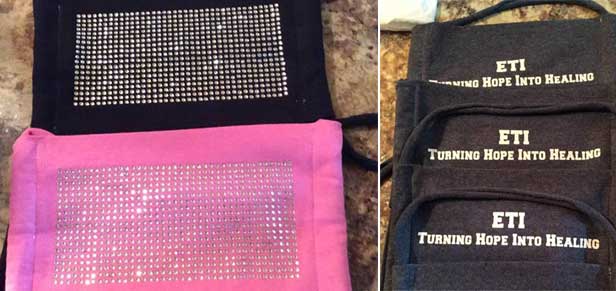
Sandy Jo Pilgram has been experimenting with various decoration techniques on her facemasks.
Ann Mackowski, an embroiderer based in Waukesha, WI, says creating masks out of colorful, patterned fabric helps keep her on an even keel during these uncertain times. “I find wearing a mask reminds me how scary it is out there, so I’m trying to find the happy,” she adds.
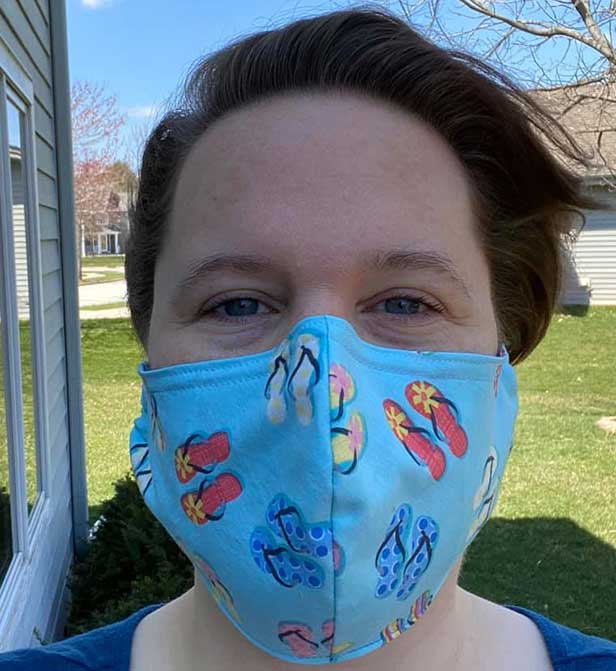
Ann Mackowski uses leftover fabric to create colorful facemasks.
Other decorators have also found a way to inject a bit of whimsy and fun into their mask creations. Carolyn Cagle, owner of Stacy, MN-based Strikke Knits, created a “black-tie formal“ white satin facemask, overlaid with black lace.
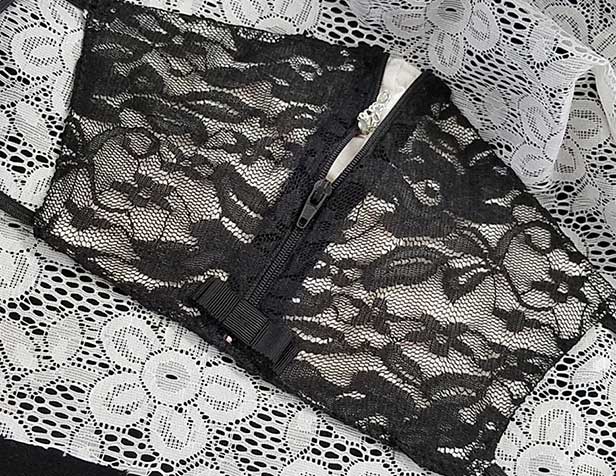
Carolyn Cagle created a facemask for formal occasions.
Jane Swanzy, owner of Houston-based Swan Marketing, was inspired by a typo in a local newscast that went viral. Harris County, TX, is mandating face coverings in public for the next 30 days, beginning April 27. A local station reported that people could use “bananas” if they couldn’t make or buy a facemask.
Don't worry Harris County folks, if you can't find masks, just use... bananas? pic.twitter.com/yG0KD7t8Ub
— Jason (@TJSmithEsquire) April 23, 2020
“Up until now, I’ve not been making masks, but I’m motivated now to make some,” Swanzy says. “And they will be bananas.”
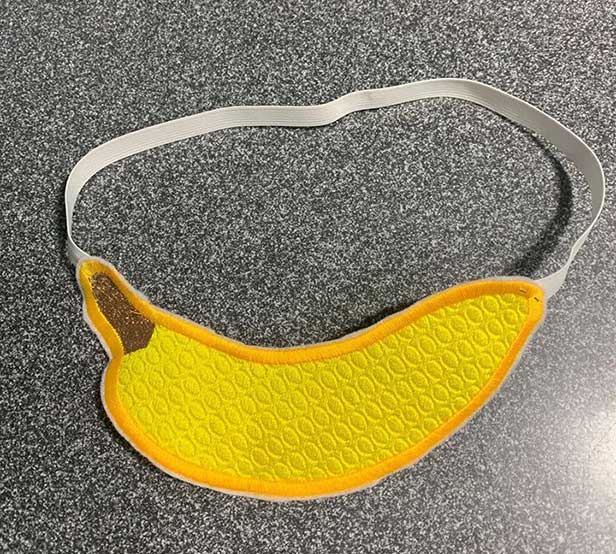
Jane Swanzy was inspired by a typo on the local news to create a banana-shaped facemask.
With the need to slow the spread of the coronavirus at the forefront of many people’s minds, it hasn’t taken long for any social stigma surrounding facemasks to disappear.
“Before, it was a weird thing if you’d see someone wearing a mask,” Jessen says. “Now, I think when you see someone else wearing a mask, you have a common bond almost. It’s like, that guy is taking this seriously.”